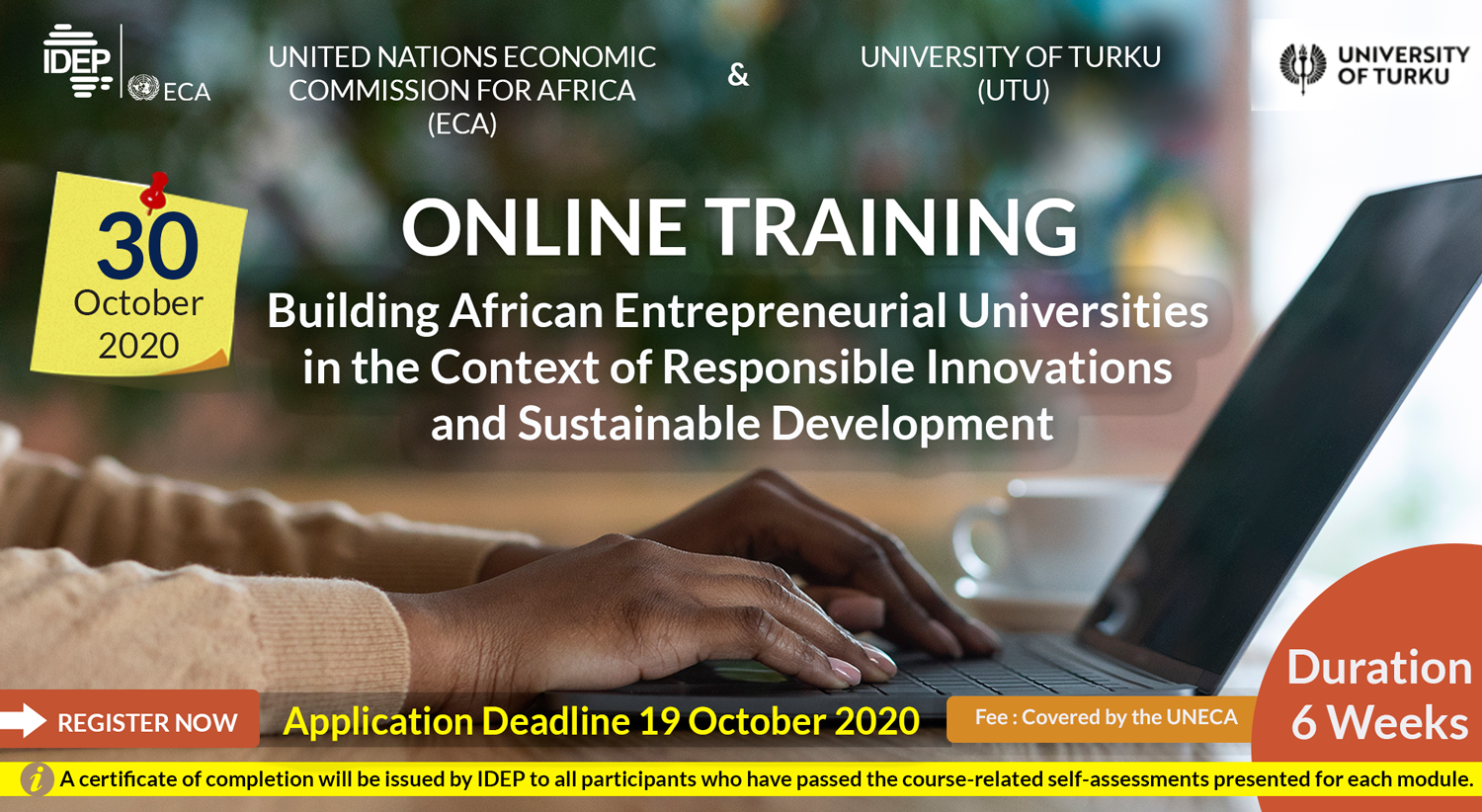Building African Entrepreneurial Universities in the Context of Responsible Innovations and Sustainable Development
PROGRAM RATIONALE
The digital transformation has impacted innovation and entrepreneurship in significant ways. Beyond simply opening new opportunities for innovators and entrepreneurs, digital transformation have broader implications for value creation and capture. As we embrace this tech-driven economy, universities must change, too, at a pace unfamiliar to higher education. While they shall retain their core mission of educating the next generation and cultivating new forms of knowledge, universities must also embrace an ever-expanding role in driving innovation and catalyzing entrepreneurship and economic development.
Africa is undergoing a profound transformation that is changing the lives of hundreds of millions of people in the continent. Rapid urbanisation, demographic growth and migration, technological development and digitalisation as well as globalisation and structural economic changes will be key issues in Africa in the 2020s and 2030s. These will result in enormous local and global changes but present both challenges and opportunities for sustainable development of places, regions and countries of Africa. The continent and the world will not be the same, and Africa’s resilience is crucial to the future of the planet.
Some ongoing changes, such as economic growth and new technologies offer major opportunities for the continent’s prosperous future. Africa also faces significant challenges, such as harmful global environmental and climate change, rapid population growth leading to potentially uncontrollable urbanisation, and increasing inequality from rapid economic growth, all of which may further marginalize the continent and many of its inhabitants. Africa’s future resilience depends on the continent, countries, and inhabitants’ ability to harness innovation and create innovative development systems in responsible and inclusive ways.
Universities must meet the challenges of the digital revolution ahead, and play an increasingly important role in national and regional innovation ecosystems and economies. They must embrace entrepreneurship as part of the academic experience, creating cultures where innovative thinking is inspired and nurtured. At a time when societal challenges are demanding discoveries at the intersections of diverse disciplines, fostering a culture of innovation and entrepreneurship is one of the most powerful ways that universities act as economic accelerators. The entrepreneurial university concept as a unique of institution in innovation systems, knowledge based societies is key to Africa’s responsive university.
Furthermore, the coronavirus outbreak is accelerating an already growing trend towards digitalization, innovative and entrepreneurial universities. Universities are currently providing a never-ending flow of high-quality, independent ideas and innovation activated by their talent and facilities. They are collaborating to address the immediate challenges of COVID-19, marshalling their resources, people, materials and facilities. Providing international response to the pandemic, serves as an ideal organizing principle that encourages a multitude of large and small innovations. Finland as one of the most transparent democratic countries has globally leading education and innovation systems. A lesson from Finland is that innovations and innovation systems can become important tools for sustainable transformation of economy and society and that innovation-linked
entrepreneurship can be fostered at the universities. A prerequisite for this is that the educational system harnesses individuals with the requisite skills; then and only then can active government policies towards entrepreneurship have the wished-for consequences. Entrepreneurship, especially in connection to innovation, seems to hold the promise of economic prosperity and growth. Africa needs theoretical and empirical base on how to contextualize the innovation systems and entrepreneurial university concepts to reflect countries’ contexts and visions. Against the above; the United Nations Economic Commission for Africa through its training Center,the African Institute for Economic Development and Planning (IDEP) in collaboration with the University of Turku are launching these two digital training on: (i) “Responsible innovations and development
in Africa” and (ii) “Entrepreneurial Universities and Youth Entrepreneurship”.
LEARNING OBJECTIVES
The course “Responsible Innovations and Development in Africa” provides a comprehensive overview of responsible innovations for development in Africa. The course consists of three modules with each having three sessions: (i) Knowledge, innovations and the African contexts; (ii) Innovation systems and policies in Africa; and (iii) Local engagements with innovations in Africa.
Participating actively in the course, the student will learn what are the key economic, social and political contexts making innovations necessary for the contemporary and future development in Africa; how knowledge and ideas develop to innovations; what are innovation (eco)systems and policies to enhance responsible innovations in Africa; what role innovations have in international aid and development policies between the Global North and Africa; and what are local engagements for innovations in Africa.
Furthermore, the course contains exercises and interactive group works that connect the course contents with the students’ local and national contexts. The course engages with literature from many academic disciplines, as well as the authors’ research and teaching experience, to explore how innovation intertwines with development policies in Africa. Reflections, when appropriate, will be made also about the experiences in Finland.
In addition, the course material contains the e-book Innovation for Development in Africa (by Jussi S. Jauhiainen & Lauri Hooli; published in 2020 by Routledge). Written in an accessible and engaging style suitable for students, policymakers, and practitioners, the book also includes a wide range of reflections, discussions, and suggestions, making it the perfect introduction to innovation and development policies, especially for audiences interested in recent developments in Africa.
The course on “Entrepreneurial Universities and Youth Entrepreneurship” examines how the conceptual glasses of the entrepreneurial university can be used to develop more interactive, responsive and adaptive higher education institutions in Africa; addressing exceptional circumstances such as the COVID19 crises. The lecture sessions focus on the Entrepreneurial University as an institutional concept and the related pathways, models and typologies how universities become entrepreneurial. Reflections, when appropriate, will be made also about the experiences in Finland.
